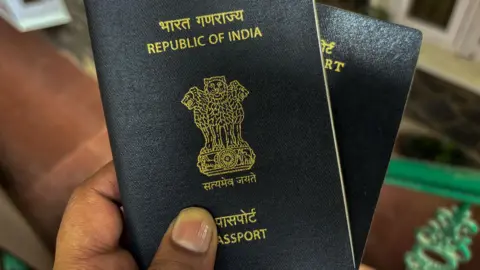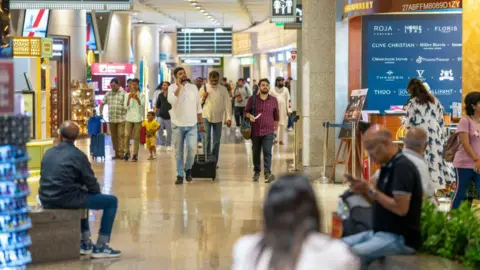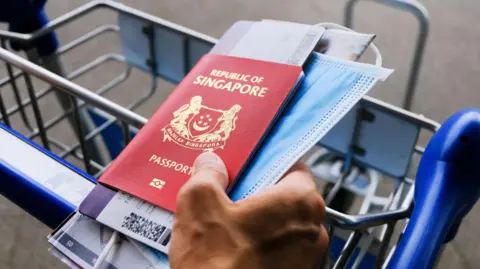Cherylann MollanBBC News, Mumbai
 Getty Images
Getty ImagesEarlier this year, a video by an Indian travel influencer complaining about India’s weak passport went viral on social media.
He said that while neighbouring countries like Bhutan and Sri Lanka were more welcoming of Indian tourists, getting visas to travel to most Western and European countries remained a challenge.
His dissatisfaction with India’s poor passport strength was reflected in the latest Henley Passport Index – a ranking system of the world’s passports based on visa-free travel – which placed India in the 85th spot out of 199 countries, five spots lower than last year.
The Indian government has not commented on the report yet. The BBC has reached out to the ministry of external affairs.
Countries like Rwanda, Ghana and Azerbaijan with much smaller economies than India – which is the fifth-largest economy globally – are ranked higher on the index at the 78th, 74th and 72nd spots, respectively.
In fact, India’s rank in the past decade has hovered in the 80s, even dipping to the 90th spot in 2021. These rankings are dismal compared to Asian nations like Japan, South Korea and Singapore, which have consistently held top positions.
This year, like the last, Singapore topped the index with visa-free travel to 193 countries. South Korea came in second with 190 visa-free destinations and Japan ranked third with 189 countries.
Meanwhile, Indian passport holders have visa-free entry to 57 countries, just like the citizens of the African country Mauritania, which shares the 85th rank with India.
 Getty Images
Getty ImagesPassport strength reflects a nation’s soft power and global influence. It also translates into better mobility for its citizens, boosting business and learning opportunities. A weak passport means more paperwork, higher visa costs, fewer travel privileges and longer waiting times for travel.
But despite the decline in the rank, the number of countries offering visa-free access to Indians has actually increased in the past decade or so.
For example, in 2014 – the year Prime Minister Narendra Modi’s Bharatiya Janata Party (BJP) came to power – 52 countries offered visa-free travel to Indians and its passport ranked 76th on the index.
A year later, it tumbled to the 85th position, then rose to 80th in 2023 and 2024, dropping again to the 85th position this year. Meanwhile, visa-free destinations for Indians increased from 52 in 2015 to 60 in 2023 and 62 in 2024.
The number of visa-free destinations in 2025 (57) is higher than what it was in 2015 (52), yet India’s rank for both these years is 85. So, why is that?
Experts say that a major reason is the increasingly competitive landscape in global mobility – meaning countries are entering into more travel partnerships to benefit their citizens and their economies. According to a 2025 report by Henley & Partners, the global average number of destinations travellers are able to access visa-free has nearly doubled from 58 in 2006 to 109 in 2025.
For example, China has increased the number of visa-free destinations its citizens can travel to from 50 to 82 in the past decade. Consequently, its rank on the index has improved from 94th to 60th during the same time period.
Meanwhile, India – which was ranked 77th on the index in July (the Henley Passport Index is updated quarterly to reflect changes in global visa policies) as it enjoyed visa-free access to 59 countries – dropped to the 85th position in October after losing access to two countries.
 Getty Images
Getty ImagesAchal Malhotra, former Indian ambassador to Armenia, says there are other factors that affect the strength of a country’s passport, like its economic and political stability as well as its openness to welcoming citizens from other countries.
For example, the US passport has dropped out of the top 10 and now occupies the 12th position – a historic low – because of its increasingly insular stance in world politics, the report says.
Mr Malhotra recalls how in the 1970s, Indians enjoyed visa-free travel to many Western and European countries, but that changed after the Khalistan movement in the 1980s, which called for an independent homeland for Sikhs in India and caused internal turmoil. Subsequent political upheavals have further chipped away at India’s image as a stable, democratic country.
“Many countries are also becoming increasingly wary of immigrants,” Mr Malhotra says. “India has a high number of people migrating to other countries or overstaying their visas and that interferes with the country’s reputation.”
Factors such as how secure a country’s passport is and its immigration procedures also play a role in gaining visa-free access to other countries, Mr Malhotra says.
India’s passport remains vulnerable to security threats. In 2024, the Delhi police arrested 203 people for alleged visa and passport fraud. India is also known for having cumbersome immigration procedures and a slow pace of visa processing.
Mr Malhotra says that technological advances, like India’s recently-launched electronic passport or e-passport, can improve security and ease the immigration process. The e-passport includes a small chip that stores biometric information, making it harder to forge or tamper with the document.
But more diplomatic outreach and travel agreements remain key to boosting the global mobility of Indians and, by extension, India’s passport ranking.
Follow BBC News India on Instagram, YouTube, X and Facebook.










